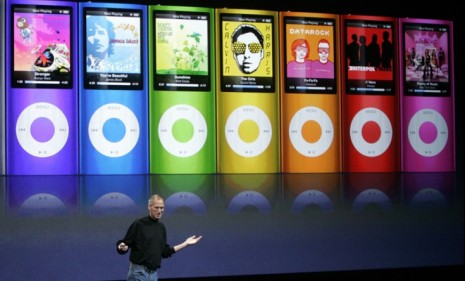Was Steve Jobs a good, old-fashioned 'capitalist'?
Some are heralding the Apple co-founder's fortune as proof the capitalist system works. Not if that means comparing him to Goldman Sachs, say others

A free daily email with the biggest news stories of the day – and the best features from TheWeek.com
You are now subscribed
Your newsletter sign-up was successful
As the world mourns visionary Apple co-founder Steve Jobs and reflects on his legacy, many are considering what Jobs' great business success and resulting multibillion-dollar fortune tell us about America's free-market economy. Indeed, some are calling the counterculture CEO, who cited LSD as a major influence and eschewed business suits for jeans and mock turtlenecks, a "hero of American capitalism." Do Jobs and Apple show that, financial crisis be damned, the capitalist system works?
Yes. Apple's success validates free markets: "The beauty of capitalism — the beauty of the iPhone world" — is that when you offer people "better stuff at better prices," you make profits, create jobs, and improve the world, says Kevin D. Williamson at National Review. Apple's success shows that the supposed "horror of putting profits over people" is a nonsensical idea. "Perhaps you do not think that Apple, or Goldman Sachs, or a professional sports enterprise, or an internet pornographer actually creates much social value; but markets are very democratic — everybody gets to decide for himself what he values."
The Week
Escape your echo chamber. Get the facts behind the news, plus analysis from multiple perspectives.

Sign up for The Week's Free Newsletters
From our morning news briefing to a weekly Good News Newsletter, get the best of The Week delivered directly to your inbox.
From our morning news briefing to a weekly Good News Newsletter, get the best of The Week delivered directly to your inbox.
Whoa. Don't clump Apple and Goldman Sachs together: I was nodding along with Williamson "at the way Apple and sports teams and internet porn fulfill the basic free-market model, offering consumers a wanted good for the market-supplied price,"says Jonathan Chait at New York. But then he "snuck Goldman Sachs onto the list." That financial titan isn't selling helpful gadgets to individuals. It's selling financial products that create "systemic risk affecting hundreds of millions of people who are not party to the transaction." That's why we have people occupying Wall Street but not Silicon Valley. "Wall Street is not the same thing as free enterprise," and "unlike Apple, poses a unique threat to the functioning of the free marketplace."
"Steve Jobs, Occupy Wall Street, and the capitalist ideal"
If anything, Wall Street could learn from Jobs: "Jobs was one of the most successful capitalists of our time, and yet he's hailed as a hero by Left and Right alike," says Dan Mitchell at SF Weekly. "His goal was simply to create products that were Insanely Great... getting rich was a by-product." If only Wall Street would take note and sell quality goods rather than "bullshit mortgages aimed at fleecing the poor and the ignorant." Bankers could still make plenty of money by serving their customers well. That's how it used to be, and "that's how capitalism should work."
"R.I.P. Steve Jobs, an insanely great capitalist"
A free daily email with the biggest news stories of the day – and the best features from TheWeek.com
Regardless, Jobs transformed capitalism: For all of Jobs' achievements, his biggest contribution may be changing the way "critics and cheerleaders think about capitalism," says Julian Baggini at Britain's Guardian. He didn't succeed by satisfying an existing explicit demand. Jobs believed consumers didn't know what they wanted — "no one thought they wanted the first desktop Mac, iPod, iPhone, or iPad before they existed." He countered "the race-to-the-bottom chains that believe the answer is always to be the cheapest," and "showed that you could, and must, charge a premium price for a premium product." He also defied "the optimistic open-source movement that thinks all good things can be made collaboratively for free."